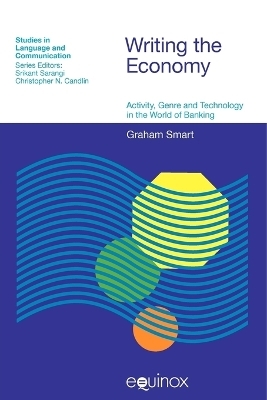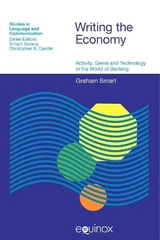Writing the Economy
Equinox Publishing Ltd (Verlag)
978-1-84553-067-9 (ISBN)
In recent years the economic policies of major financial institutions such as the European Union Central Bank, the U.S. Federal Reserve, and the International Monetary Fund have received growing media attention, reflecting increased public awareness of the impact of these institutions on the global economy and, more immediately, on the material conditions of our everyday lives. Writing the Economy: Activity, Genre and Technology in the World of Banking takes readers into one such site, the Bank of Canada, that country's central bank and monetary-policy authority. Drawing on qualitative data gathered over two decades (1984-2004) and employing theories of activity, genre, narrative, and situated learning, the book provides an ethnographic account of the role of technology-mediated discourse in the Bank's knowledge-building, policy-making, and public communication. The first part of the book describes how the Bank's economists employ a set of written and oral discourse genres in combination with computer-run economic models to create specialized knowledge about the Canadian economy that is applied by the organization's senior decision-makers in directing national monetary policy.
The book then examines the economists' use of another set of technology-mediated discourse genres to orchestrate the Bank's external communications with government, the media, the business sector, financial markets, labour, and academia. The book also explores the way in which the economists' discourse practices facilitate individual and organizational learning. In a foreword, Charles Bazerman describes the book's contribution to our understanding of organizational discourse and knowledge-making, situating this contribution in the study of economic rhetoric and the social formation of economy.
Graham Smart is an Assistant Professor in the School of Linguistics and Applied Language Studies at Carleton University, Ottawa, Canada. He has published studies of writing in workplace and academic settings as well as work on interpretative ethnography. His recent research also focuses on public-policy discourse and environmental rhetoric.
Forward: Persuasive Economies by Charles Bazerman Chapter One: Introduction The StudyThe Organization of the Book Chapter Two: The Monetary-Policy Process - The Big Picture Knowledge-Building, Ideology, and Rhetoric in Economics "The Economy" as a Social Construct Knowledge-Building, Policy-Making, and External Communications Methodological Reflections Chapter Three: Genres of Knowledge-Building and Policy-Making Mathematical Models in Disciplinary Knowledge-Building The Quarterly Projection Model The Projection Exercise The White Book The "Monetary-Policy Story" Variations on Genre Conventions Methodological Reflections Chapter Four: The Interplay of Discourse Genres and Economic Modelling What the Quarterly Projection Model Is Building, "Selling," and Enhancing QPM What QPM Does QPM's Influence on Written and Spoken Discourse Methodological Reflections Chapter Five: Genres of External Communications The "Communications Strategy" Two Key Features of the Genre Sub-Set The Role of Genres in the Communications Strategy Methodological Reflections Chapter Six: Conclusion: Answering The "So What?" Question A Summary of the Account Implications for Discourse Theory Implications for Research in Organizational Discourse Implications for Teaching of Organizational Writing A Few Words of Conclusion Appendices A to J
| Erscheint lt. Verlag | 1.10.2006 |
|---|---|
| Reihe/Serie | Studies in Language & Communication |
| Zusatzinfo | 3 photos & 6 figures |
| Sprache | englisch |
| Maße | 156 x 234 mm |
| Themenwelt | Wirtschaft ► Betriebswirtschaft / Management ► Finanzierung |
| Betriebswirtschaft / Management ► Spezielle Betriebswirtschaftslehre ► Bankbetriebslehre | |
| ISBN-10 | 1-84553-067-5 / 1845530675 |
| ISBN-13 | 978-1-84553-067-9 / 9781845530679 |
| Zustand | Neuware |
| Haben Sie eine Frage zum Produkt? |
aus dem Bereich




